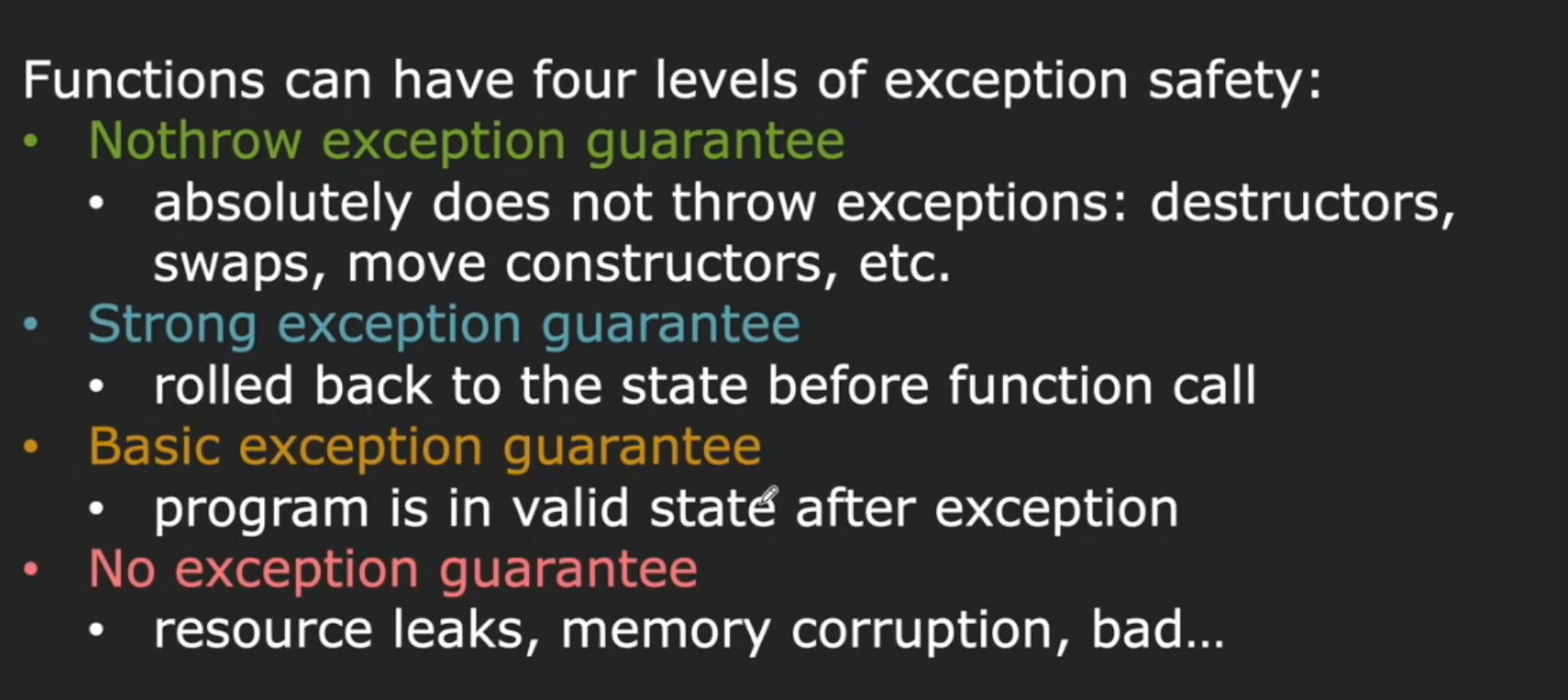Lec 15: RAII, Smart Pointers and Building CPP Projects¶
Code Paths¶
string EvaluateSalaryAndReturnName(Employee e) {
if (e.Title() == "CEO" && e.Salary() > 100000) {
cout << e.First() << " " << e.Last() << " is overpaid" << endl;
}
return e.First() + " " + e.Last();
}
Hidden code paths: There are (at least) 23 places where this function can throw exceptions (and thus return early):
- 1 Copy constructor of Employee parameter, may throw.
- 5 Constructor of temp
string/ints, may throw. - 6 Call to Title, Salary, First (2), Last (2), may throw.
- 10 Operators may be user-overloaded, may throw.
- 1 Copy constructor of string for return value, may throw.
And there are 3 exception-free code paths (i.e. normal code paths).
So, in total, at least 26.
Memory Leak Issue¶
string EvaluateSalaryAndReturnName(int idNumber) {
Employee* e = new Employee(idNumber);
if (e->Title() == "CEO" && e->Salary() > 100000) {
cout << e->First() << " " << e->Last() << " is overpaid" << endl;
}
auto result = e->First() + " " + e->Last();
delete e;
return result;
}
If any exception is thrown in these segment of code,
if (e->Title() == "CEO" && e->Salary() > 100000) {
cout << e->First() << " " << e->Last() << " is overpaid" << endl;
}
auto result = e->First() + " " + e->Last();
it will cause memory leak.
More general concern: resources that need to be returned¶
| Acquire | Return | |
|---|---|---|
| Heap Memory | new | delete |
| Files | open | close |
| Locks | try_lock | unlock |
| Sockets | socket | close |
| ... | ... | ... |
Exception Safety¶
There are four levels of exception safety.
- In Google C++ style guide, they follow the first level.
- But in our course, we shall follow the third level - "basic exception guarantee"

RAII¶
Note: A Better Name For RAII is CADRE - Constructor Acquires,Destructor Releases.
Comparison between Google's guide and RAII:
- Google's guide guarantees that all hidden data paths are forbidden.
So we can plainly free all pointers immediately before
return. - RAII guarantees that
- All resources should be acquired in the constructor. All resources should be released in the destructor.
- And no more (so as to prevent double delete)
The Rationale Behind RAII¶
- There should never be a "half-valid"state of the object. Object useable after its creation.
- The destructor is always called (even with exceptions), so the resource is always freed.
Example: ifstream¶
The old code (which doesn't comply with RAII):
void printFile() {
ifstream input;
input.open("hamlet.txt");
string line;
while (getline(input, line)) {
cout << line << endl;
}
input.close();
}
The new code that complies with RAII. i.e.
openon constructingcloseon destructing
void printFile() {
ifstream input("hamlet.txt");
string line;
while (getline(input, line)) { // might throw exception here!
cout << line << endl;
}
// no close call needed!
} // stream destructor,releases access to file
Example: lock_guard¶
The old code (which doesn't comply with RAII), i.e.
- lock on
constructing(lock_guard) - unlock on
destructing(lock_guard)
void cleanDatabase(mutex& databaseLock, map<int, int>& database) {
databaseLock.lock();
// other threads will not modify the database
// modify the database
// if an exception is thrown, the mutex is never unlocked!
databaseLock.unlock();
}
The new code:
void cleanDatabase(mutex& databaseLock, map<int, int>& database) {
lock_guard<mutex> lock(databaseLock);
// other threads will not modify the database
// modify the database
// if an exception is thrown, that's fine!
// no release call needed
// lock always unlocked when function exits
}
Also, the implementation of lock_guard is:
template <typename T>
class lock_guard {
public:
lock_guard(T& lock) : acquired_lock(lock) {
acquired_lock.lock();
}
~lock_guard() {
acquired_lock.lock();
}
private:
T& acquired_lock;
};
Example: Smart Pointer¶
std::unique_ptr¶
- Uniquely owns its resource and deletes it when the object is destroyed.
- Cannot be copied!
- If you have two
unique_ptrinstances pointing to the same memory, when one of them is destructed and the memory get released, the pointer of the other instance will become invalid.

std::shared_ptr¶
- Resource can be stored by any number of
shared_ptrs. - Deleted when none of them point to it.